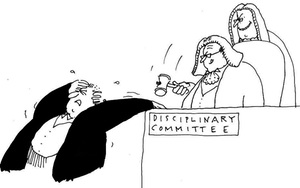Negotiations have resulted in minor revisions to the proposed Solicitors Conduct Rules ... At least three law societies found the LCA's original "ethical" rules objectionable ... Large law firms wag the dog  Concerted head butting within the Law Council's ethics committee has seen some of the more objectionable features of the solicitors conduct rules diluted.
Concerted head butting within the Law Council's ethics committee has seen some of the more objectionable features of the solicitors conduct rules diluted.
The rules are to take affect in each jurisdiction before the national legal profession regime comes into full swing.
Like most rules cooked-up by trade and professional associations "ethics" are designed to smooth the path for income creation schemes and trade protection. These ones are no exception.
Justinian has detailed some of the more offensive provisions in the original version here and Theodora has done it here.
Conflict of duties
In its original form rule 11 sought to tip "informed consent" on its head.
The rule would have made it relatively easy for solicitors to act concurrently for two clients whose interests are "adverse".
If clients was informed, in whatever way deemed appropriate by a solicitor, that a conflict or potential conflict of duties arose then they were taken to have given "informed consent" to the solicitors' conflicted position.
The revised rule simply deletes the provision that allowed the notion of "informed consent" to be quite so conspicuously perverted. This bit has now been scrubbed:
"For the purposes of Rule 11.3.2, where a client engages a law practice, having been informed that the circumstances referred to in Rule 11.2 exist or may exist, then that client is taken to have given the informed consent required by Rule 11.3.2."
The rule should have gone the whole hog and required solicitors to have consent in writing before they could straddle a conflict of duties.
Conflicts and solicitors' own interests
Rule 12 also allowed self-preferment to prevail on the strength of limited information to the client.
Originally the rule was unclear, to say the least, as to whether a solicitor was required to fully reveal a financial benefit arising from referring a client onto someone else.
All that was required for informed consent was information that a commission or benefit may be payable to the referring solicitor. The quantum could remain a secret, in which event the consent was hardly "informed".
The revarnished version of the rule now says a referral fee is OK, "provided that the solicitor has first disclosed the payment or financial benefit to the client.
It's hard to know whether that really puts full disclosure centre-stage.
Common law
The original version of the rules high-handedly tried to supplant the common law, saying in rule 2.2:
"In considering whether a solicitor has engaged in unsatisfactory professional conduct or professional misconduct, the rules apply notwithstanding any inconsistency with the common law."
In other words, the Law Council wanted to impose a lower standard of behaviour, which nonetheless would have left solicitors open to common law actions for breach of duty.
The latest modification says:
"In considering whether a solicitor has engaged in unsatisfactory professional conduct or professional misconduct, the rules apply in addition to the common law."
Solicitor as material witness in a client's case
Rule 27 is still in contention. It provides:
"27.1 In a case in which it is known, or becomes apparent, that a solicitor will be required to give evidence material to the determination of contested issues before the court:
27.1.1 the solicitor may not appear for the client in the hearing;
27.1.2 the solicitors’ associate, or a law practice of which the solicitor is a member, may act for the client in connection with the hearing:
PROVIDED
(i) exceptional circumstances apply in the solicitor’s reasonable opinion; and
(ii) the client, having been given an opportunity to, where practicable, obtain independent legal advice concerning the issue, consents."
"Where practicable" is a late addition, but it does nothing to improve the ethical landscape.
The rule is unclear as to whether solicitors in these circumstances should not give evidence or stop acting for the client altogether.
Some partners, who have floated to the top of large Sydney law shops, say they want the rule changed so that it only applies to solicitor advocates.
This would open the way to non-advocate solicitors to continue to act and to give evidence for clients without any bothersome fig-leaves being applied.
Reserving work
"Legal services" is defined in the conduct rules as "work done, or business transacted, in the ordinary course of legal practice".
That circular definition gives lawyers a large footprint over work that could be done just as satisfactorily by non-lawyers at a lower rate of charging.
* * *
The solicitors conduct rules rules as originally proposed attracted significant criticism from law societies in Queensland, Western Australia and South Australia.
Academics from universities around Australia also wrote to the LCA pressing the case for a more rigorous ethical framework.
So far, the changes have been grudging and minimal. The large law firm group continues to wag the dog.
See here for Solicitors Conduct Rules in their original form.